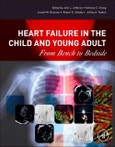Heart Failure in the Child and Young Adult: From Bench to Bedside combines multiple etiologies for pediatric heart failure, including congenital heart disease, cardiomyopathies, infectious diseases and metabolic abnormalities. This comprehensive resource combines research from multiple contributors with current guidelines to bridge the knowledge gap for the recognition and management of heart failure in children. Coverage begins with the basic science of heart failure, then progresses through diagnosis, management, treatment and surgery, finally concluding with advanced special topics, including genetics, self-management and nanomedicine.
Please Note: This is an On Demand product, delivery may take up to 11 working days after payment has been received.
Table of Contents
Section I: Basic Science of Heart Failure 1. Molecular and Cellular Mechanisms in Heart Failure 2. Cardiovascular Receptors and Signaling in Heart Failure 3. Inflammatory Mediators in Heart Failure 4. Mechanisms of Hypertrophy in Heart Failure 5. Hemodynamic Adaptive Mechanisms in Heart Failure 6. Neurohormonal Axis and Natriuretic Peptides in Heart Failure 7. The Pressure-Volume Relationship in Heart Failure 8. Systolic and Diastolic Dysfunction Mechanisms and Assessment of Systolic vs Diastolic Heart Failure 9. The Alveolar-Capillary Interface and Pulmonary Edema 10. Echocardiographic Quantitation of Ventricular Function 11. Magnetic Resonance Imaging Assessment of Heart Failure 12. Assessment of Heart Failure by Invasive Methods
Section II: Clinical Diagnosis and Management of Pediatric Heart Failure 13. Epidemiology and Economic Aspects of Pediatric Heart Failure 14. Clinical Recognition of Congestive Heart Failure in Children 15. Classification of Heart Failure 16. Right Ventricular Dysfunction 17. Pediatric Myocarditis 18. Dilated Cardiomyopathy 19. Clinical Features of Restrictive Cardiomyopathy and Constrictive Pericarditis 20. Hypertrophic Cardiomyopathy 21. Left Ventricular Noncompaction 22. Arrhythmogenic Cardiomyopathies 23. Valvular Insufficiency and Heart Failure 24. Valvular Stenosis and Heart Failure 25. Coronary Artery Disease in Children and Young Adults 26. Heart Failure in Congenital Heart Disease Including Single Ventricle Circulation 27. Heart Failure in Adults With Congenital Heart Disease 28. Dysrhythmias and Ventricular Dysfunction and Heart Failure 29. Heart Failure in the Fetus 30. Heart Failure in the Neonate 31. Heart Failure in Pediatric Pulmonary Diseases 32. Heart Failure and the Pediatric Cardiorenal Syndrome 33. Heart Failure in Pediatric Oncologic Disease 34. The Failing Cardiovascular System in Sepsis 35. Outpatient Management of Pediatric Heart Failure 36. Quality of Life and Psychosocial Care in Pediatric Heart Failure 37. Quality Metrics and Quality Improvement in Pediatric Heart Failure 38. Nursing Aspects of Heart Failure
Section III: Medical Treatment for Pediatric Heart Failure 39. Diuretics and Invasive Fluid Management Strategies 40. Inotropic Agents in Heart Failure 41. Phosphodiesterase Inhibitors 42. Use of Vasodilators in Heart Failure 43. Beta-adrenergic Receptor Blockade 44. Low Cardiac Output Syndrome in the Intensive Care Setting 45. New Therapeutic Strategies in Heart Failure 46. Electrophysiologic Devices in Heart Failure 47. Catheter Device Therapy for Heart Failure
Section IV: Cardiac Surgery and Pediatric Heart Failure 48. Post-Transplant Heart Failure 49. Surgical Strategies for the Failing Systemic Ventricle 50. Valve Intervention for Valve Failure 51. General Principles of Mechanical Cardiopulmonary Support 52. Short-Term Mechanical Cardiopulmonary Support Devices 53. Decision Making in Ventricular Assist Device Support in Pediatric Patients 54. Long Term Ventricular Assist Devices in Children 55. The Adult Experience with Long-Term Assist Devices 56. Future of Mechanical Support Devices in Children and Young Adults
Section V: Special Topics 57. Genetics and Genomics 58. Genetic Testing 59. Data Management and Analytics 60. Self-Management and Outpatient Monitoring 61. Regenerative Medicine and Nanomedicine 62. Nanomedicine 63. Nutritional Assessment and Management in Pediatric Heart Failure








